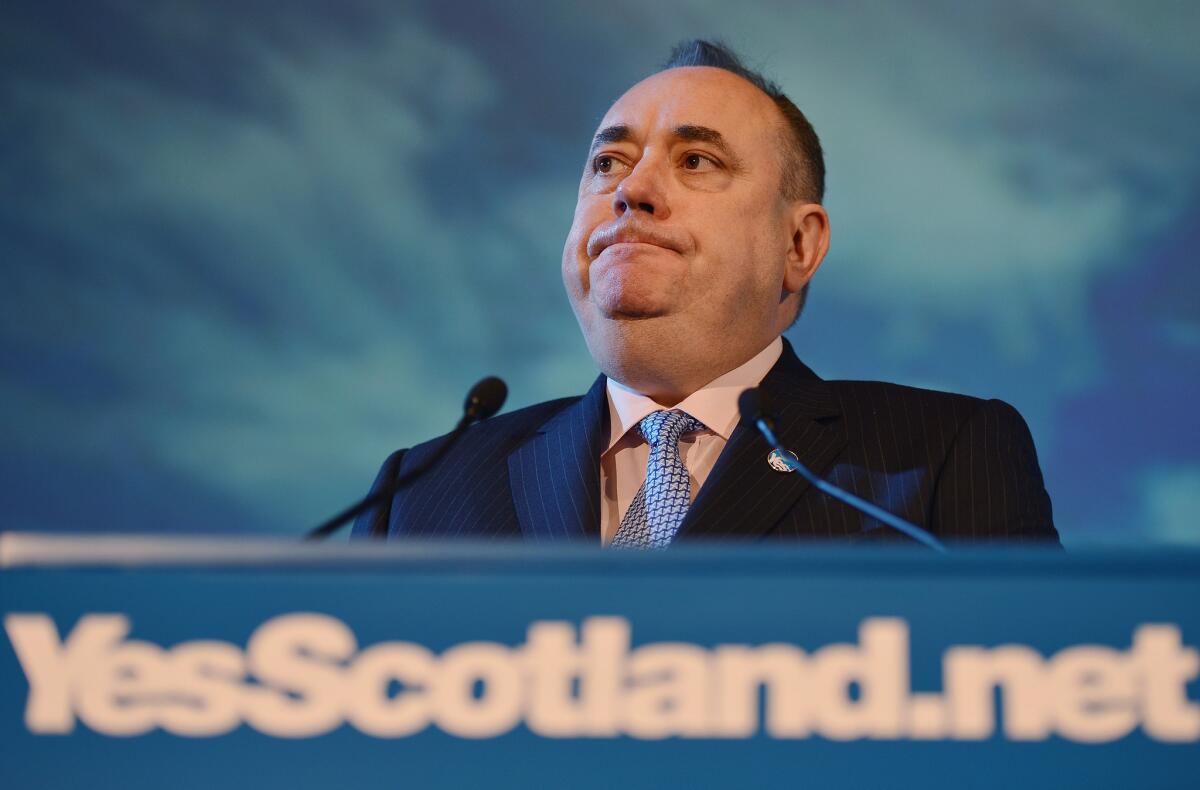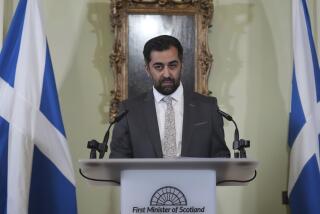Scottish referendum results in shift in power across Britain

- Share via
Reporting from Edinburgh, Scotland — The campaign signs are coming down. Gone are the colorful “yes” and “no” buttons that seemed to grace every lapel in Scotland. The dream of independence is dead, perhaps for a generation or more.
But though the status quo prevailed in Scotland’s historic referendum, scuttling an effort to break free of ties to Britain, there was a sense in the dazed aftermath Friday that a great deal had changed.
In the most immediate example, Scotland’s independence leader, First Minister Alex Salmond, announced that he would step down in November. For Scotland to move forward, he said, it needs fresh blood.
The brash and very shrewd leader of the Scottish National Party personified the drive for secession, and he ultimately failed. But in the process, he extracted painful promises of reforms granting Scotland greater autonomy, including increased authority to raise taxes and adopt more generous health and welfare benefits.
The result is a tectonic shift in power, not just in Scotland, but across all of Britain. British Prime Minister David Cameron, in a landmark speech Friday pledging to honor his promise to Scotland, followed it up with another momentous offer: The same deal will be extended to England, Wales and Northern Ireland.
“We now have a chance, a great opportunity, to change the way the British people are governed, and change it for the better,” Cameron said, opening the door to new debate on English self-rule, which has included calls for a new regional parliament, or votes on English laws that are restricted to lawmakers from England.
“We have heard the voice of Scotland, and now the millions of voices of England must be heard,” Cameron said.
The debate brings directly to the table issues of English nationalism that have festered in the background for years, echoing debates over federalism and local control that are playing out around the globe, from Scotland to the Middle East to Ukraine.
The autonomy debate takes in a number of larger issues, including whether Britain remains part of the European Union and the future of Cameron’s Conservative government, now that Scotland’s relatively liberal, Labor-leaning voters will remain in the fold.
Twenty-eight of Scotland’s 32 regional authorities voted to remain part of Britain in Thursday’s referendum.
Unionists won 55% of the vote, an outcome that thrilled Edinburgh resident Katherine Thomson as she left a shopping mall.
“Why would we want to be divided? We’re such a small island, and we’ve achieved so much in the past, fought wars together,” she said. “We’re better together, definitely.”
Scotland’s pro-independence campaign built a fierce momentum in the final weeks before the referendum. Somewhat symbolically, traditionally working-class Glasgow — Scotland’s largest city — voted to secede from Britain, but the defeat left more than 1.6 million “yes” voters sorely disappointed.
“I’m gutted,” said David Archibald, who was back at work doing building renovation after a long night watching referendum results trickle in. “I wanted Scotland to stand on its own two feet, look after its own affairs.”
Salmond, in a brief resignation speech, tried to focus on the extent to which the referendum promised to bring change even without passing.
“We now have the opportunity to hold Westminster’s feet to the fire on the vow that they have made to devolve further meaningful power to Scotland,” Salmond said from his official residence.
“We lost the referendum vote but can still carry the political initiative. More importantly, Scotland can still emerge as the real winner.”
Britain’s main political parties have agreed to a swift timetable for devolution. Draft legislation is due as early as January. British leaders acknowledged the divisions aroused by the referendum and promised to act quickly to heal them. Stocks rallied Friday as the business community expressed approval for the vote results.
“This result will be greeted with a collective sigh of relief across the business community,” said John Cridland, director general of the Confederation of British Industry. “Business has always believed that the union is best for creating jobs, raising growth and improving living standards, and welcomes that the people of Scotland want to play an integral role in this internationally successful partnership.”
Queen Elizabath II added her voice to the accolades.
“Now, as we move forward, we should remember that despite the range of views that have been expressed, we have in common an enduring love of Scotland, which is one of the things that helps to unite us all,” she said in a statement released from Balmoral Castle in Scotland.
Even President Obama, representing a country whose history may have inspired Scotland’s secessionists, voiced his approval. “We welcome the result of yesterday’s referendum on Scottish independence and congratulate the people of Scotland for their full and energetic exercise of democracy,” he said in a statement that also paid homage to the “strong and special relationship” between the United States and Britain.
Cameron, however, now faces a backlash from members of his own Conservative Party.
At issue is the question of England, specifically a political quandary known as the West Lothian Question that has long bedeviled Britain. Scotland, along with Wales and Northern Ireland, began down a road of decentralization several decades ago. They established their own legislative assemblies and already enjoy varying control over a broad array of domestic policy, including education, transport and environmental matters.
In England however, Scottish, Welsh and Irish members of Parliament still have a say in how England is run, an arrangement that irks many conservatives.
“There’s a public concern out there,” said Alan Trench, a constitutional researcher at University College London. “The English think they’re being mistreated.”
Cameron’s pledge was intended to appease those concerns.
“Just as Scotland will vote separately in the Scottish Parliament on their issues of tax, spending and welfare, so too England, as well as Wales and Northern Ireland, should be able to vote on these issues, and all this must take place in tandem with, and at the same pace as, the settlement for Scotland,” he said.
In Wales, Welsh First Minister Carwyn Jones immediately seized on the opportunity. “Wales cannot, and will not, play second fiddle as we work up a new constitutional framework,” he said at a news conference. “The old union is dead. We need to forge a new one.”
But with such an expansive proposal and with Cameron’s backbenchers at his heels over Scotland, Peter Lynch, an expert on Scottish politics at the University of Stirling, questioned just what the prime minister can deliver.
“Cameron appeared in Scotland with a vow that his own party doesn’t support,” said Lynch. “It seems to be falling apart. If you just voted ‘no’ because you were promised more, you might feel like an idiot.”
Cameron nevertheless was visibly relieved by the outcome of the Scottish vote.
“It would have broken my heart to see our United Kingdom come to an end,” he said Friday in an address outside his office on Downing Street in London. “Now the debate has been settled for a generation.... There can be no disputes, no reruns. We have heard the settled will of the Scottish people.”
In his resignation announcement, Salmond expressed his own concern about possible delays to Scotland’s promised devolution.
And a “yes” supporter in Edinburgh who gave his name as Michael Scotland warned of the danger of reneging on devolution.
“Unless those changes are delivered, I think it won’t be too long before another referendum is knocking on the door,” he said.
Werth is a special correspondent.
More to Read
Sign up for Essential California
The most important California stories and recommendations in your inbox every morning.
You may occasionally receive promotional content from the Los Angeles Times.










